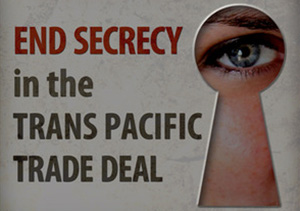
WELLINGTON (Evening Report/Pacific Media Watch): New Zealand's High Court in Wellington will today hear an application for judicial review of Trade Minister Tim Groser’s blanket refusal to release information relating to the Trans-Pacific Partnership Agreement (TPPA) sought under the Official Information Act.
Professor Jane Kelsey, who made the initial request in January, said the case would remain important even if ministers from the 12 countries reached an accord in Atlanta, US, this week.
"The government insists that no substantive changes can be made to agreement once negotiations are concluded. But New Zealanders, including MPs, need access to background information to assess the implications of the agreement, hold the government to account, and pressure it not to exercise its executive power of ratification," Professor Kelsey said.
The case is precedent setting in several ways. It will be the first time the courts have given a definitive interpretation of certain provisions of the Official Information Act. The ruling will be relevant to future requests involving similar kinds of trade and investment negotiations and to the application of the Act more generally.
The other applicants supporting the case are Consumer NZ, Ngati Kahungunu, Greenpeace, Oxfam, Association of Salaried Medical Specialists (ASMS), New Zealand Nurses Organisation (NZNO), and the Tertiary Education Union (TEU).
Executive director of ASMS Ian Powell said that “without transparency and a proper level of disclosure, there is a highly likelihood that New Zealand’s high quality public health service will be seriously eroded to the detriment of patients, their families and taxpaying citizens.
"We support this application for judicial review because the public interest requires this level of disclosure.”
'Not about trade'
Kaiwhakahaere Keri Nuku said NZNO saw the challenge posed by the TPPA as “not about trade, but the potential public health impacts of an agreement that has been negotiated under a blanket of secrecy. The NZ public have a right know the costs, risks and purported benefits that such an agreement could bring to a health system that is currently failing some of our most vulnerable populations.”
Greenpeace considers “this agreement will have potentially far reaching consequences for the future of New Zealand and how we safeguard our oceans, rivers and the air we breathe.
"That’s why it’s critical that the details of what’s being traded away in our name are made available, before it’s too late,” said executive director Bunny McDiarmid.
This work is licensed under a Creative Commons Attribution-NonCommercial 3.0 New Zealand Licence.




